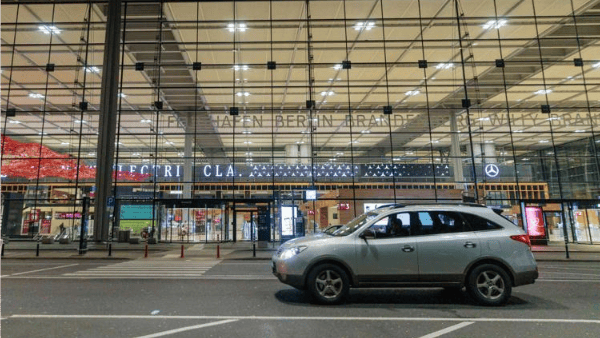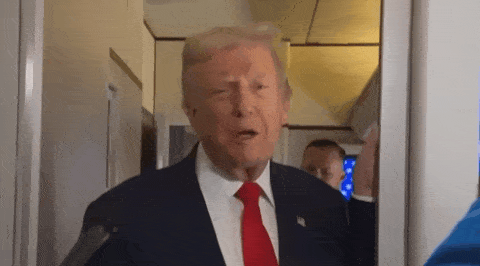
Hi Global Recap readers,
I’ve spent the past hour writing and deleting this opener, since this is one of the only parts of the newsletter where I can actually talk to you directly (ideally with a banger).
And yet… nothing came out.
Have a great weekend. 😔
🇻🇪🇺🇸 VENEZUELA & US
Trump Rejects
Venezuela Strikes
Trump told reporters on Air Force One today that he has not approved attacks on Venezuela, contradicting reports that the White House was ready to hit Venezuelan targets and that planners had already picked strikes.
Context: Earlier, the Miami Herald reported (citing unnamed sources) that the US had decided to strike Venezuelan military‑linked ports and airports “at any moment,” while the Wall Street Journal said targets were under consideration but no final decision had been made, together creating the impression of imminent action.
Denial: White House deputy press secretary Anna Kelly dismissed those reports as coming from people who "don’t know what they’re talking about."
Fake: US SECRETARY OF STATE Marco Rubio also commented on Miami Herald's reporting.
Thoughts: Online, some argue that the administration’s denial is a strategic move, meant to keep Maduro from taking precautions before a potential strike.
Still, it’s worth noting that Trump and his team weren’t evasive or dodging questions. They flatly said “no.”
That kind of unequivocal denial lends credibility to the idea that the reports are false.
After all, a firm refusal followed by a sudden reversal would make the administration look reckless. If a strike were actually planned, it would be far more strategically prudent to stay vague and confirm it afterward. But you never know.
📌 Context: Since taking office again, Trump has framed Venezuela’s Maduro government as an illegitimate actor tied to narco-trafficking, and Venezuelan opposition leader Maria Corina Machado has encouraged Washington to increase pressure.

🇩🇪 GERMANY
Berlin Halts Flights

Berlin Brandenburg Airport stopped traffic for nearly two hours after officers spotted a drone near the northern runway on Friday evening. Police rolled in with a helicopter, could not find the device, but the airport still had to untangle its schedule into the night.
Timeline: Airport staff froze takeoffs and landings from 8:08 p.m. to 9:58 p.m. local time on Friday, which is a long blackout for a capital-city airport that lives off tight turnarounds.
Impact: A "whole series of flights" was diverted to other German airports. Departures to Basel, Oslo, and Barcelona stayed on the ground. An incoming London flight diverted to Hamburg. Arrivals from Stockholm, Antalya, and Helsinki had to reroute.
Rules: German airports enforce a 1.5-kilometer (0.93 miles) no-drone ring to protect approach and departure paths. Violations can trigger a full stop of operations and can lead to heavy penalties because flying a drone next to commercial traffic is classified as dangerous to civil aviation.
Operations: To clean up the mess, the airport temporarily relaxed Berlin’s normal night-flight restrictions so airlines could bring people in late instead of stranding them in other cities.
Pattern: Officials brought up earlier drone shutdowns in Munich and other European airports, so this isn’t some weird one-off, it’s a pattern. But are we really just acting like this is all part of a normal news cycle now?
📌 Context: European airports have built expensive counter-drone plans, but many still rely on visual sightings plus a precautionary halt, which means that even one unconfirmed object can affect several countries’ flight networks.

🎙 PODCASTS
Do You Listen
To Podcasts?

I do. I’m big on ancient history, geopolitics (no surprise), and tech.
But here’s the thing: a lot of geopolitics podcasts feel… sanitized. Polished to the point of bland and impersonal.
Most of the time, they are not even analyzing. They are just regurgitating.
That’s why we’ve been pumping out daily episodes on our own show. If you like Global Recap’s style of storytelling and want to stay informed on the move, check out Business Basics on Apple Podcasts or Spotify. 👇
📌 Plus: They’re perfect for when you’re driving, working out, or just doing chores. You can learn something while you’re at it AND make the time pass faster. 😬

🇮🇱 ISRAEL
Prosecutor Leaks
Abuse Video

Maj. Gen. Yifat Tomer-Yerushalmi
Israel’s military advocate general, Maj. Gen. Yifat Tomer-Yerushalmi, just admitted she was the one who leaked the video showing soldiers assaulting a Palestinian detainee at the Sde Teiman detention center in southern Israel. She resigned today after the uproar inside the government and the army.
Who: Tomer-Yerushalmi was the top military prosecutor, which means she was the officer expected to defend the army’s legal integrity in wartime. She said she leaked the clip to show that the army was not targeting soldiers unfairly but was doing basic accountability.
What: The video, first aired on Israel’s Channel 12 in 2024, showed soldiers at Sde Teiman assaulting and reportedly sodomizing a Gaza detainee while the military was still investigating that same unit. The unit’s arrest triggered angry right-wing activists who actually stormed the base in protest.
Backlash: Defense Minister Israel Katz and other right-leaning politicians said she had betrayed the state and ruled out reinstating her. They also ordered investigations into everyone who helped her release the clip.
Tension: Her letter said the military has a duty to investigate any credible violence against detainees, even "the vilest of detainees," but she argued that this basic idea no longer convinces everyone inside Israeli politics.
Bigger picture: Human rights groups have accused Israel of abusive detention practices throughout the Gaza war, especially at Sde Teiman, where Palestinians were held for months without charge, reported beatings, scarce food, poor conditions and limited oversight.

🇷🇺🇺🇸 RUSSIA & US
Why US Axed
Budapest Summit

Russian President Vladimir Putin (left) and US President Donald Trump (right)
A new Financial Times report suggests the US scrapped a planned Trump–Putin summit in Budapest after Moscow refused to ease its terms on Ukraine. While the sudden cancellation puzzled many at the time, it now appears to have fallen apart for all-too-familiar reasons.
Demands: Moscow insisted Ukraine surrender additional territory, drastically cut its armed forces, and accept permanent non-NATO status as preconditions for a ceasefire.
Timing: The meeting was slated for November 2025, then shelved once Russia reiterated those conditions in a memo to Washington.
Positions: Trump reportedly backed an immediate ceasefire on current lines, while Putin pushed what he calls addressing the “root causes” of the invasion.
Ukraine: Volodymyr Zelenskyy said Ukraine is ready for talks but will not withdraw first and pledged a ceasefire plan “in the coming 10 days,” paired with calls for more pressure and long-range missiles.
Sanctions: After the collapse of plans for a peace summit, Washington slapped new sanctions on Russian energy giants Rosneft and Lukoil last week, a move Zelensky welcomed, though he warned it wouldn’t be enough to bring Putin to the table.
Here's the Financial Times report (for reference), but you must be a paying subscriber to read.
📌 Context: Russia’s full-scale invasion of Ukraine began in 2022 and has hardened positions on territory, security guarantees, and Ukraine’s Western alignment. Negotiations repeatedly stall when proposals hinge on Ukrainian land transfers and NATO renunciation.





